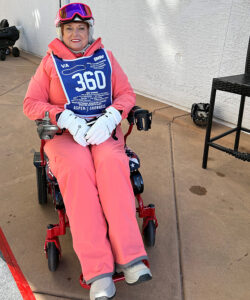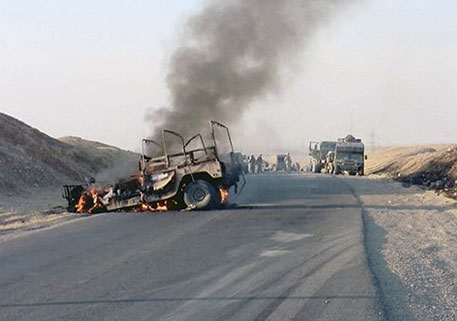
Brenda Reed out-processed from the Army on crutches.
Reed had injured her foot while running in ill-fitting combat boots designed for men, and the physician assistant on base didn’t take the injury seriously. Reed was told to suck it up and go back to work.
Eventually, at her sergeant’s insistence, Reed was sent to a hospital where she learned her foot had been broken in four places and was healing incorrectly. Before she knew it, her military career was over—and that was only the beginning of one of her biggest trials.
Reed’s injury worsened over the years. When she twisted her ankle on the same foot—a minor injury for most—the bones in her leg shattered. By 2013, after years of major surgeries, Reed’s leg was amputated.
Afterward, Reed, who survived sexual assault in the military and dealt with post-traumatic stress disorder, felt vulnerable and unsure of how she would protect herself if needed. Two years later, she found herself flying down a snow-covered mountain on a bi-ski in Snowmass, Colorado, feeling anything but vulnerable. She felt empowered.
“After that, it was like, you know, I can still do anything,” said Reed, who currently serves as the DAV Department of Florida commander.
This year marks Reed’s eighth time attending the National Disabled Veterans Winter Sports Clinic. Along with bi-skiing, she has participated in curling, fly-fishing and kayaking.
“I’ve done just about every sport, except I’m not really crazy enough to do the sled hockey,” she said.
Jokes and sled hockey aside, the clinic continues to give Reed more than she ever thought possible.
“It’s just been like an entire world of opportunities has opened up,” she said.
Along with the healing power of adaptive sports, Reed said she’s found a special community through the clinic.
“It’s kind of like a reaffirmation that we’re OK; we’re going to be fine. We’re going to make it through whatever is going on, because we have the support of all these people,” Reed said.
The clinic has also been a good way for Reed to meet other women Veterans.
“I’ve made friends with so many women there, and we have formed a support group and we call each other and keep in touch throughout the year,” she said.
Reed admits her first time at the clinic in 2015 was a bit scary, and she understands Veterans who may be hesitant or pessimistic. But she urges them to push past that and take the chance.
“It’s a little scary your first run, but then when you realize that someone has your back, you just kind of let go and start enjoying it,” she said.
“That’s when the exhilaration comes. That’s where the miracle comes from.”






